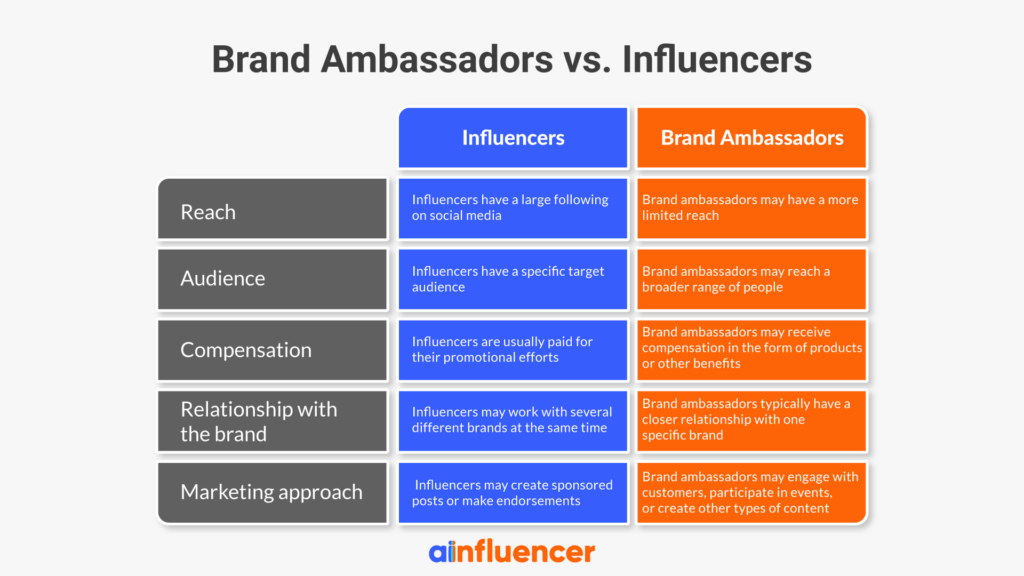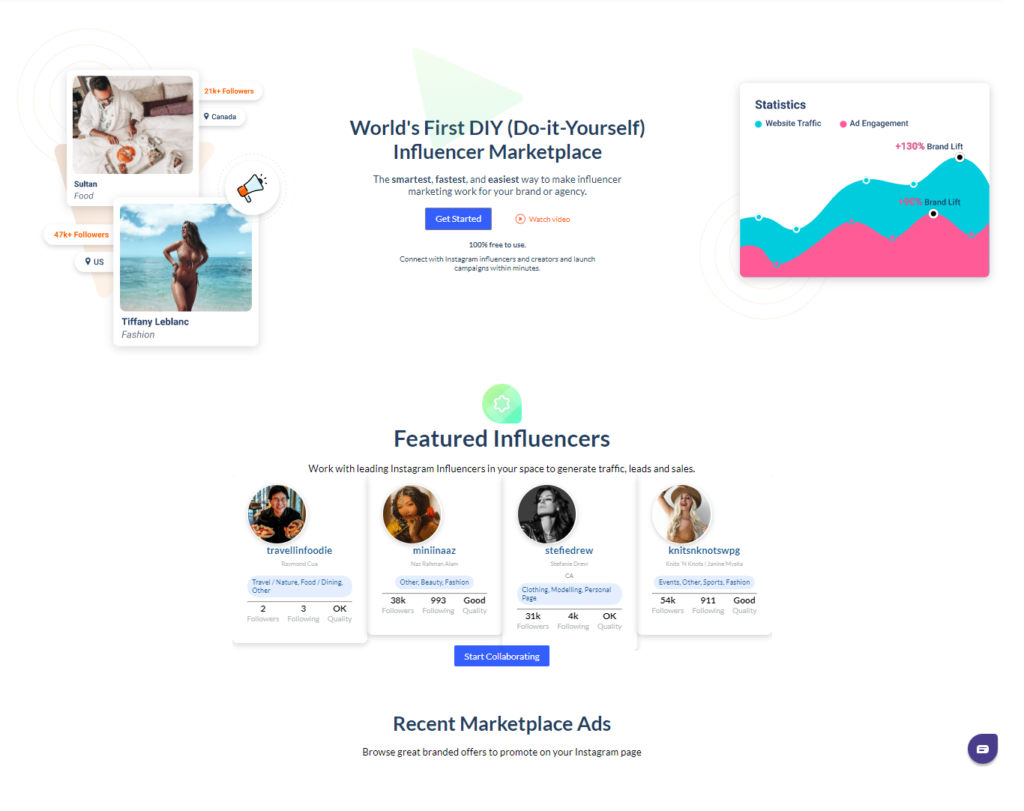Brand ambassadors vs. influencers; which one is more influential? Or you may wonder what the difference is between an influencer and a brand ambassador.
People are now using digital platforms to promote everything from sleep aid pills to fitness training to clothing and fashion. Brand ambassadors and influencers of any type have a massive role in spreading the name of a brand or its products.
But these two concepts may have differences in action and the purpose they pursue. So, ambassadors and influencers can’t be used interchangeably. You need to know the similarities and differences between brand ambassadors and influencers to be able to choose the right one.
In this article, we’ll go through everything you need to know to choose between an ambassador and an influencer.
Brand Ambassadors vs. Influencers; Definition
Both influencers and ambassadors help businesses improve marketing strategies. They act as key components of influencer marketing. A study by Schlesinger Associates showed that people increasingly spend more time on social media, so they are likely to spend some of that time engaging with influencers.
So it is an excellent opportunity for brands to use brand ambassadors or influencers based on their needs.
I have just read an article in which there was a statement claiming the real difference between brand influencers, ambassadors, and advocates is just “the functionality of the brand.” That is simply not true. There are essential dissimilarities that need to be understood extensively.
To know it better, let’s define the brand ambassadors vs. influencers separately.
Who Is An Influencer
Influencers are famous figures on social media who can influence their followers. As a brand, your relationship with influencers is likely short-term. An influencer wouldn’t ideally promote a product more than once or twice.
Instagram influencers, for example, promote your brand by sharing a post about your products and services on their Stories, Feeds, or Reels.
To make it short, an influencer is a group or individual who possesses the following traits:
- They have their own determined and engaged audience;
- Influencers have their own established channels and resources they benefit from;
- They probably also work with other brands, possibly even competitors;
- Influencers create their own content; however, they are also featured within their feeds.
An influencer may not have used your product before, as well. Instead, you’ll choose an influencer for their reputation, reach, target audience, engagement rate, or simply popularity.
For instance, an Instagram cat influencer might be asked by a cat food manufacturer to promote their food, vitamin, and mineral supplements for cats. Or a cosmetics brand may ask a beauty influencer to advertise a fresh shade of lipstick.
Influencers typically demand compensation for their work in influencer marketing and product promotion. It might be cash, gifts, coupons, or any combination of the three.
Additionally, an influencer will likely only promote a product if they are interested in it and they think it would fit in with their personal brand. Remember that the right influencer doesn’t necessarily have a massive number of followers to be compelling enough.
In fact, influencers are classified into four distinct categories:
- Celebrities and Mega influencers: Social media stars with usually millions of followers. They usually have a vast audience reach but low engagement rates.
- Macro influencers: These personalities usually have over hundred thousand followers, but less than a million (100K to 1M.) They have a medium reach and medium engagement with their fans.
- Micro influencers: These influencers have fewer followers, usually in thousands or tens of thousands (10K to 100K,) so they have a low reach, but they have a much higher engagement rate and reliable authority in their niche.
- Nano influencers: they have less than 10K followers but have a high engagement rate.
The right influencer for you to choose depends on your brand’s desired reach and the average engagement you’d like the influencer to have with their followers. To understand the distinction between brand ambassadors vs. influencers, it is also necessary to understand what a brand ambassador is.
Who Is A Brand Ambassador
A brand ambassador is a person who represents a company or product and promotes it through various marketing efforts. They serve as a face for the brand and help to create a positive image and increase brand awareness.
A brand ambassador may participate in in-person events, make social media posts, create content, and engage with customers to build brand loyalty. In some cases, brand ambassadors are just the consumer of a brand and advocate it because they are satisfied with it.
Because of their affinities for the brand, their capacity to reach a sizable audience, and their word of mouth marketing, businesses and brands are looking for ambassadors. They set up an ambassador program and recruit enthusiastic fans (ambassadors) of their brand to be their long-term promotional partners.
Ambassadors don’t always have to be renowned celebrities or popular influencers on social media. For example, Mozzythecat is a brand ambassador for the @vetpetbox brand.
A brand ambassador doesn’t have to be a considerable authority, either. As long as they’re committed to spreading the word about your brand, your best brand ambassadors could be your friends, customers, or coworkers, often known as peer advocates.
How Do Brand Ambassadors Promote Your Brand
Since brand ambassadors are usually deployed for a longer period than your regular influencer marketing campaigns, they tend to publish posts, stories, and tweets about your brand repeatedly on social media and talk about it in their content and mention it at the events they attend.
Rather than sticking to a pre-written script, they would likely talk to others organically and one-on-one, as if they’re having a conversation with their friend (although they might have a protocol to follow that you have already provided.)
They might receive payment, dedicated coupons or discount codes, or freebies for the services they offer, but it’s not a requirement since their work is mostly in the form of collaboration. Often, brand ambassadors are quite happy to work with you without specific compensation – seeing your brand succeed is incentive enough.
The best part of having a brand ambassador is that they usually create content like posts, product images, reviews, and descriptions for you on their social media feed for free.
They will use their unique perspective to talk about how your brand has helped them in their own way, and you wouldn’t have to worry about them making a genuine and authentic connection with their audience since they already know them best.
Difference Between Brand Ambassador And Influencer
Influencers and brand ambassadors are similar in that they both promote a company or product. However, influencers vs. ambassadors have specific characteristics that distinguish them.
The key difference between a brand ambassador and an influencer is that a brand ambassador is chosen by the company, while an influencer is paid by the company.

Still, there are some critical differences between brand ambassadors vs. influencers:
- Reach: Influencers have a large following on social media, while brand ambassadors may have a more limited reach.
- Audience: Influencers have a specific target audience, while brand ambassadors may reach a broader range of people.
- Compensation: Influencers are usually paid for their promotional efforts, while brand ambassadors may receive compensation in the form of products or other benefits.
- Relationship with the brand: Influencers may work with several different brands at the same time, while brand ambassadors typically have a closer relationship with one specific brand.
- Marketing approach: Influencers may create sponsored posts or make endorsements, while brand ambassadors may engage with customers, participate in events, or create other types of content.
In summary, influencers are primarily paid to promote a brand. In contrast, brand ambassadors are representatives of a brand who promote it through various marketing efforts and may have a closer relationship with the brand.
Ambassadors are groups or individuals whose values align with your brand and tend to form long-term relationships to grow their brand alongside yours. They usually have a sort of attachment to your brand, creating it, manufacturing it, refining it, consuming it, or even selling its merchandise.
You can also become an Instagram brand ambassador using the best influencer marketplace, Ainfluencer. It is a DIY marketplace that allows you to connect with brands. You only need to download the Ainfluencer app, sign up for a free account, and then you can search through numerous brands’ campaigns.

Should I Work With A Brand Ambassador Or An Influencer To Promote My Brand
Suppose you are looking for a one-time promotion of your brand by someone with quite a reputation, and you aren’t looking to grow your brand alongside a campaign with like-minded incentives. In that case, you might want to look into various influencer marketing campaigns.
On the other hand, if you would rather carry on a longer-term project with someone and want more authentic reviews that benefit you through WOM marketing, brand ambassadors might be your thing.
A brand ambassador is a good choice if you’re looking for consistent and committed brand promotion. On the other hand, an influencer is a person with a large following on social media who has the power to impact purchasing decisions.
On the other hand, if you’re looking for a short-term, targeted campaign to reach a specific audience, an influencer is a good choice.
Points To Consider When Choosing Between A Brand Ambassador And An Influencer
The selection between a brand ambassador vs. influencer depends on the goals of your marketing campaign. For example, a brand ambassador is a long-term, official representative of your brand who has its own ambassador influencer program to promote your products or services.
To choose between influencer vs. ambassador, consider the values, beliefs, and image of both the brand and the individual. Select a brand ambassador or influencer whose personal brand aligns with your own.
Additionally, consider the size and demographics of the audience reached by each option. Ensure the influencer or brand ambassador reaches the target audience for your campaign.
Ultimately, your choice will depend on your specific marketing goals, target audience, and budget. Furthermore, when choosing between brand ambassadors vs. influencers, ask yourself the following questions:
- Relevance: Does the person align with your brand values and messaging? Is the influencer or brand ambassador relevant to your target audience?
- Authenticity: Does the person have a genuine interest in your brand and products?
- Cost: How much are you willing to pay for their services?
- Duration: Do you want a long-term partnership or a short-term campaign?
- Measurable impact: Can you track the success of the collaboration?
- Campaign goals: What do you want to achieve with your brand ambassador or influencer partnership?
By weighing these factors, you can choose the right fit for your brand and campaign goals.
Conclusion
In this article, we tried to specify the differences between brand ambassadors vs. influencers. Your brand might hire ambassadors, influencers, bloggers, advocates, or even fans for various reasons. Brand ambassadors are already interested in your business, while influencers are chosen for direct audience reach and thus have to be “influenced” as well.
However, both brand ambassadors and influencers can be recruited to help meet your brand’s same objectives – to introduce products or services to their audience from their own perspective. Since they both have established a certain position within their fields, their recommendations can go a long way in attracting customers to your marketing campaigns.
You can rely on Ainfluencer whether you want to choose between influencers vs. ambassadors as a brand or want to become an influencer or a brand ambassador as an individual.
FAQs
There are distinctions between Brand ambassadors vs. influencers. An influencer can be a brand ambassador, and a brand ambassador can be an influencer. However, the choice between influencers and brand ambassadors is dependent on the brand’s goals.
An ambassador influencer program is a marketing strategy in which a brand collaborates with passionate individuals about the brand and its products. Brand ambassadors’ strategy is to use word of mouth. They use your products and talk about them passionately.
The ambassadors are typically given personalized referral codes or links to share with their audience, and the brand tracks their performance to reward their success. The program aims to increase brand awareness and sales and to build long-term relationships with loyal customers who can serve as brand advocates.
![You are currently viewing Brand Ambassadors vs Influencers: Which is Best for Your Business? [2024 Update]](https://blog.ainfluencer.com/wp-content/uploads/2020/11/Brand_Ambassadors_Vs._Influencers_Ultimate_Guide.png)



![Read more about the article 55 Body Positive Influencers On Instagram [2023 Non-Celebrity]](https://blog.ainfluencer.com/wp-content/uploads/2021/02/Body-Positive-Influencers-On-Instagram-Non-Celebrity-300x182.png)




